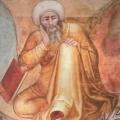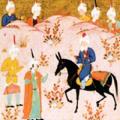152 - Richard Taylor on Averroes
Averroes scholar Richard C. Taylor joins Peter to talk about Averroes' views on the relation between Islam and philosophy.
Themes:
In addition to Prof Taylor's publications mentioned under further reading for episode 151:
• R.C. Taylor, “Themistius and the development of Averroes' noetics,” in Medieval Perspectives on Aristotle's De Anima, ed. R.L. Friedman and J.-M. Counet (Louvain: 2013), 1-38.
• R.C. Taylor, “Aquinas and the Arabs: Aquinas’s First Critical Encounter with the Doctrine of Averroes on the Intellect, In 2 Sent. d. 17, q. 2, a. 1,” in Philosophical Psychology in Arabic Thought and the Latin Aristotelianism of the 13th Century, ed. L.X. López-Farjeat and J. Tellkamp (Paris: 2013), 142-83 and 277-96.
• R.C. Taylor, “Textual and Philosophical Issues in Averroes’ Long Commentary on the De Anima of Aristotle” in The Letter before the Spirit.The Importance of Text Editions for the Study of the Reception of Aristotle, ed. A.M.I. van Oppenraaij and R.S. van Gelder-Fontaine, (Leiden: 2012), 267-87.
• R.C. Taylor, “Averroes on the Ontology of the Human Soul,” Muslim World 102 (2012) 580-96.
• R.C. Taylor, “Averroes on the Sharīʿah of the Philosophers,” in The Muslim, Christian, and Jewish Heritage: Philosophical and Theological Perspectives in the Abrahamic Traditions, ed. R.C. Taylor and I. Omar (Milwaukee: 2012), 283-304.
Richard C. Taylor's website with a full list of publications.

Andalusia


 ..
..



Comments
Hi Peter, Your podcast are
Hi Peter,
Your podcast are really great to get introduced to great philosophical tradition especially for some one like me whose background is Medicine not philosophy and a 20 minutes a week is indeed nourishing to mind. I very much liked your Avicenna's flying experiment may be because I like Avicenna. My question now is on Averroes: how much of his work have survived in its original Arabic and how many are there in Latin and Hebrew. Has there been an attempt to retranslate his surviving Latin work into Arabic.
Alamin
In reply to Hi Peter, Your podcast are by Alamin Berhanu
Averroes: what survives
Hi there,
Thanks! There is quite a lot of Averroes in Arabic, especially the "short" and "middle" commentaries, but some very significant works are lost except in Latin or Hebrew (notably the Long Commentary on De Anima for which we have only fragments of the Arabic). I don't know actually whether there are Arabic "retro" translations of that or other commentaries into Arabic, though if you look for instance at Taylor's notes on his translation of the De Anima commentary you'll see he frequently discusses what the underlying Arabic could/would have been.
A good but as yet incomplete online resource on Averroes, by the way, is here.
Peter
Music in podcast & Ibn Gabirol
If you mentioned it somewhere I've forgotten - what is that song that you've been playing on the Islamic philosophy podcasts?
Also - if you find yourself devoting a podcast to Ibn Gabirol, you might consider playing a little of Orphaned Land's metal cover of his liturgical poem, Shofet Kol Ha'aretz (Olat Hatamid):
Studio version: http://www.youtube.com/watch?v=9TbzEjWsONU
Live: http://www.youtube.com/watch?v=M4z8v_UFPSA
In reply to Music in podcast & Ibn Gabirol by Berel Dov Lerner
Full Metal Gabirol
How awesome is that?! Think it might blow some people's earphones out though.
Anyway I always put up a little note about new music in the first episode where it is used, which in this case is this page. I like this clip a lot, I will miss it.
Dreams and the Arabic Parva Naturalia
Dear Peter,
Thank you! This interview, for me, was particularly helpful not only as a guide into Ibn Rushd's Decisive Treatise but also re Ibn Khaldun's Prolegomena. I know this blog page is about Ibn Rushd, and that there is a prior podcast for Khaldun, but listeners may be interested to know that Khaldun's text provides a good example of what Taylor was discussing re the importance of dreams, as outlined in Arabic Parva Naturalia.
In books 1 and 3 of the Prolegomena we see the standard scala naturae argument moving up through the vegetative, sensitive and rational souls and their respective objects of knowledge (with Khaldun providing a wonderful Neoplatonist othorgenetic evolutionary argument from apes to humans to angels in passing!). There are three forms of human knowledge and corresponding types of rational soul: scholarly discursive/dianoic, mystical/intuitive/noetic and finally prophetic/angelic/(manic ?)and the latter explains the origin of the Surahs.
I had looked high and low in the Oxford Parva Naturalia to source this reference without luck. Professor Taylor illustrates why - the Arabic version had a few bonus features! From a Peripatetic point of view it is indeed a "strange thing" as Taylor suggests. But from a Neoplatonist and/or Sufi point of view, one can see how this text supports a cosmic procession and return in a proto-orthogenetic way. A very pretty world picture aesthetically, which, I think, is analogous to some 19th C. "Idealist" evolutionary schemes.
Peter - if I what I have written above is roughly correct, have you covered similar cosmologies in prior episodes (I doubt Khaldun would be unique here). Further, if you could inform of any papers on the Arabic Parva Naturalia or related further reading (is it translated into English?), I would be very grateful.
Thanks again.
Craig
God and the Universe
Hi Peter,
thanks first of all for the podcasts, they are both highly instructive and entertaining. I really enjoy them!
One question about Averroes (that you may have answered already somewhere ...): Would it be correct to say that Averroes considers God the causa finalis of the universe but not the causa efficiens?
Thanks again, Jürgen
In reply to God and the Universe by Jürgen Wüllrich
God as cause
As it happens I wrote a whole paper about that (in the Interpreting Averroes volume I edited with Matteo Di Giovanni). Averroes actually has a convoluted argument for showing that God is the formal, final, and efficient cause of the universe - sort of indirectly, by being the cause of motion.
Religion of the Philosophers
A comment at the end was made about a religion specific to the philosophers. Would this mean that he would have potentially viewed philosophers of various faiths as being closer to truth on religious matters than the common people of his own faith? If that is the case, how much is his continued belief in Islam the belief it is closest to the truth vs it being driven primarily as a matter of circumstances?
Add new comment